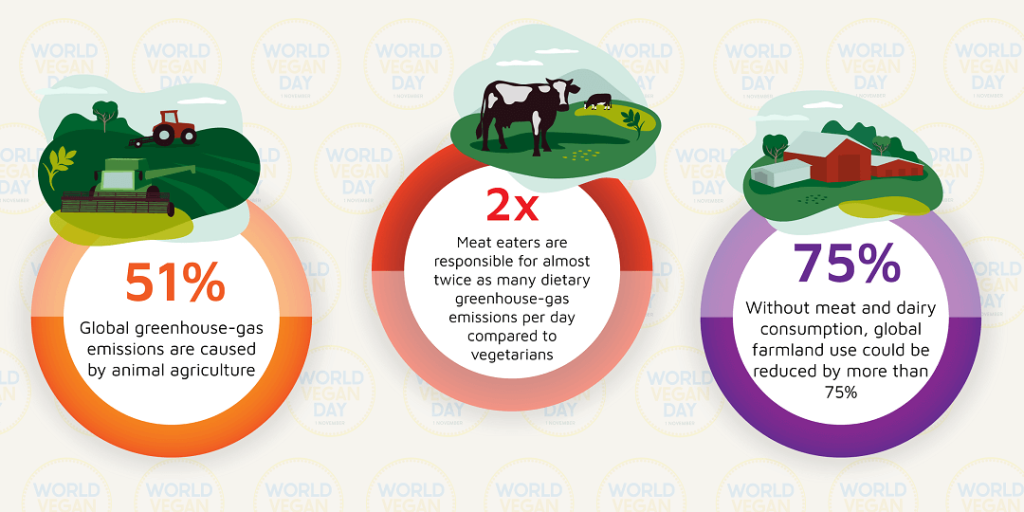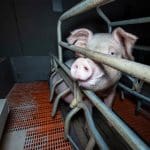In today’s world, where environmental sustainability is a pressing concern, adopting a vegan lifestyle can make a significant positive impact. By choosing to go vegan, not only are you making a compassionate choice for animals, but you are also contributing to the preservation of our planet for future generations.

The Environmental Impact of Animal Agriculture
Animal agriculture is a leading cause of deforestation, water pollution, and greenhouse gas emissions. The production of meat, dairy, and other animal products requires vast amounts of land, water, and feed. This contributes to deforestation as forests are cleared to make space for livestock grazing or to grow crops for animal feed.
Furthermore, animal agriculture generates a significant amount of water pollution. The runoff from animal waste pollutes rivers, lakes, and oceans, leading to water contamination and harmful algal blooms. Additionally, the excessive use of fertilizers and pesticides in animal feed crops further contributes to water pollution.
In terms of greenhouse gas emissions, animal agriculture surpasses the entire transportation industry combined. Livestock produces methane, a potent greenhouse gas, through digestion and manure decomposition. Additionally, the production and transportation of animal feed, as well as the processing and refrigeration of animal products, contribute to carbon dioxide emissions.
By choosing a vegan lifestyle, individuals can significantly reduce their carbon footprint and help protect the environment. Plant-based diets require fewer resources, such as land and water, compared to animal-based diets. This reduces the demand for animal agriculture and mitigates its environmental impact.
How Veganism Reduces Greenhouse Gas Emissions
Animal agriculture is responsible for more greenhouse gas emissions than the entire transportation industry combined. The production of meat and dairy products releases methane and carbon dioxide, two potent greenhouse gases that contribute to global warming.
By choosing a plant-based diet, individuals can help combat climate change. Plant-based foods have a much lower carbon footprint compared to animal products. The cultivation of crops requires significantly less land, water, and energy, making it a more sustainable option.
Additionally, raising animals for food requires large amounts of feed, which often leads to deforestation as land is cleared for growing animal feed crops. Forests act as carbon sinks, absorbing CO2 from the atmosphere and helping to mitigate climate change. By reducing the demand for animal-based products, veganism can help preserve vital forest ecosystems and prevent further deforestation.

Furthermore, the livestock sector is a significant contributor to methane emissions. Methane is a potent greenhouse gas with a much higher warming potential than carbon dioxide. Cattle, in particular, produce methane through their digestive process called enteric fermentation. By reducing the consumption of animal products, we can effectively reduce methane emissions and lessen the impact of livestock on the environment.
The Importance of Sustainable Agriculture for Our Planet
Sustainable agriculture plays a crucial role in preserving the health and well-being of our planet. By promoting responsible farming practices, sustainable agriculture aims to minimize environmental damage and ensure the long-term health of ecosystems.
One of the key benefits of sustainable agriculture is the preservation of soil fertility. Conventional farming methods often rely on excessive use of chemical fertilizers, which can degrade soil quality over time. In contrast, sustainable agriculture encourages the use of organic fertilizers and crop rotation techniques to maintain soil health and prevent erosion.
In addition to soil fertility, sustainable agriculture also promotes biodiversity conservation. By avoiding the use of harmful pesticides and genetically modified organisms (GMOs), sustainable farming practices help protect and preserve diverse plant and animal species. This, in turn, contributes to the overall health and stability of ecosystems.
Furthermore, sustainable agriculture aims to minimize water usage and reduce pollution. By implementing efficient irrigation systems and adopting water-conservation techniques, sustainable farmers contribute to the global effort to address water scarcity and depletion. Sustainable agricultural practices also focus on minimizing water pollution by limiting the use of chemical fertilizers and promoting natural pest control methods.
Supporting sustainable agriculture is not only beneficial for the environment but also for the people involved in the farming industry. By promoting fair trade practices and providing equitable working conditions, sustainable agriculture helps improve the livelihoods of farmers and agricultural workers.
Overall, sustainable agriculture is essential for preserving the long-term health and prosperity of our planet. By supporting sustainable farming practices, vegans play a crucial role in ensuring the sustainability of our food systems and protecting the environment for future generations.
The Role of Plant-Based Diets in Conserving Water
Animal agriculture is a major consumer of water, contributing to water scarcity and depletion worldwide. The production of meat and animal products requires vast amounts of water for animal drinking, cleaning, and irrigation of feed crops.
By adopting a vegan diet, individuals can play a crucial role in conserving water resources. Plant-based diets have a significantly smaller water footprint compared to diets that include animal products. This is because plant-based foods generally require less water for cultivation and processing.
For example, it takes about 1,800 gallons of water to produce just one pound of beef, while producing a pound of vegetables requires only around 39 gallons of water. By choosing plant-based foods, vegans help reduce water consumption and work towards addressing global water shortages.
Furthermore, plant-based diets also decrease the indirect water footprint associated with animal agriculture. This refers to the water used in growing feed crops for livestock. By reducing the demand for animal-based products, vegans indirectly reduce the amount of water required in agriculture.
Protecting Biodiversity Through Vegan Lifestyle
The expansion of animal agriculture leads to habitat destruction, endangering countless species and disrupting ecosystems. By choosing a vegan lifestyle, individuals can help protect biodiversity by reducing the demand for animal-based products.

Veganism promotes a more sustainable and ethical approach to food consumption, as it eliminates the need for raising animals for meat, dairy, and eggs. This reduction in demand helps reduce the pressure on natural habitats that are destroyed or altered to make way for livestock grazing or growing animal feed crops.
By opting for plant-based foods instead, vegans support a more balanced and harmonious relationship with the environment. They contribute to the conservation of natural ecosystems and the preservation of species that depend on these habitats for their survival.
The Link Between Animal Agriculture and Deforestation
Animal agriculture plays a significant role in deforestation, contributing to the destruction of vital forest ecosystems. Land is cleared for livestock grazing or to grow crops for animal feed, leading to widespread deforestation.

This deforestation has devastating consequences for biodiversity and ecosystem stability. Countless species are endangered or displaced as their habitats are destroyed. Forests, which serve as carbon sinks, are also greatly diminished, exacerbating the effects of climate change.
By choosing to go vegan, individuals can help combat deforestation. By reducing the demand for animal products, we can alleviate the need for clearing land for animal agriculture. This, in turn, helps to preserve vital forest ecosystems and the biodiversity they support.
Veganism as a Solution to Food Waste
Animal agriculture contributes to food waste through inefficient use of resources and excessive production. The production of meat, dairy, and other animal-based products requires vast amounts of land, water, and energy. Additionally, the process of raising and slaughtering animals often results in significant food losses.
By embracing veganism, we can reduce food waste and ensure more efficient use of agricultural resources. Plant-based diets require less land, water, and energy compared to animal-based diets. This means that more food can be produced with fewer resources, reducing the overall waste in the food system.
Furthermore, veganism encourages a focus on fresh fruits, vegetables, grains, legumes, and other plant-based ingredients. These food items have longer shelf lives and are less likely to spoil quickly, reducing the chances of food being wasted at the consumer level.
Overall, by choosing a vegan lifestyle, individuals can contribute to minimizing food waste and promoting a more sustainable food system.
Promoting a Healthier Planet: Benefits of Veganism
Vegan diets offer various benefits for both personal health and the environment. By choosing a vegan lifestyle, individuals can contribute to the promotion of a healthier planet in the following ways:
1. Lower Rates of Heart Disease, Obesity, and Chronic Illnesses
Studies have shown that adopting a vegan diet can help lower the risk of heart disease, obesity, and other chronic illnesses. Plant-based diets are typically lower in saturated fats and cholesterol, which are known to contribute to these health issues. By reducing the demand for animal-based products, vegans can improve their own health while also alleviating the burden on healthcare systems.
2. Reduced Greenhouse Gas Emissions
An alarming amount of greenhouse gas emissions are produced by animal agriculture. By eliminating animal products from their diet, vegans significantly reduce their carbon footprint. This choice helps combat climate change by decreasing methane and CO2 emissions and minimizing the negative impact on the environment.
3. Conservation of Natural Resources
Veganism promotes the conservation of natural resources. The production of meat and dairy products requires a substantial amount of land, water, and energy resources. By opting for plant-based alternatives, individuals can ensure a more efficient use of these resources. This, in turn, helps protect the environment and preserves natural habitats.
4. Decreased Water Consumption
The water footprint of animal agriculture is staggering. By adopting a vegan diet, individuals can actively contribute to water conservation efforts. Animal agriculture consumes vast amounts of water for livestock drinking, irrigation purposes, and crop production. By reducing the demand for animal products, vegans help alleviate water scarcity and address global water shortages.
5. Preservation of Biodiversity
The expansion of animal agriculture poses a significant threat to biodiversity. Deforestation and habitat destruction are direct consequences of clearing land for livestock grazing and growing animal feed crops. By choosing a vegan lifestyle, individuals can help protect biodiversity by reducing the demand for animal-based products. This choice supports the preservation of ecosystems and the countless species that depend on them.
In conclusion, embracing veganism offers numerous benefits for both personal health and the well-being of our planet. By making conscious dietary choices, individuals can play an active role in promoting a healthier planet for themselves and future generations.
Conclusion
Going vegan is not only beneficial for personal health but also has a significant positive impact on the environment. Animal agriculture is a leading cause of deforestation, water pollution, and greenhouse gas emissions. By choosing a vegan lifestyle, we can significantly reduce our carbon footprint and help protect the planet.
Switching to a plant-based diet can help combat climate change by reducing methane and CO2 emissions. Additionally, supporting sustainable agriculture promotes responsible farming practices that ensure the health of ecosystems and minimize environmental damage. Vegans also contribute to the preservation of soil fertility and biodiversity.
Animal agriculture consumes vast amounts of water, contributing to water scarcity and depletion. By adopting a vegan diet, we can conserve water and contribute to addressing global water shortages. Moreover, veganism helps protect biodiversity by reducing the demand for animal-based products, which in turn reduces habitat destruction and the endangerment of countless species.
Furthermore, animal agriculture is a major driver of deforestation, as land is cleared for livestock grazing or growing animal feed crops. Going vegan can combat deforestation and preserve vital forest ecosystems. Veganism also plays a role in reducing food waste through the more efficient use of resources.
Overall, choosing a vegan lifestyle promotes a healthier planet. Vegan diets are associated with lower rates of heart disease, obesity, and other chronic illnesses. By embracing veganism, we not only benefit our personal health but also contribute to the well-being of the environment. Going vegan can help save our planet.
















































